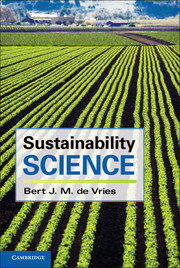Book contents
- Frontmatter
- Contents
- Preface
- 1 Introduction
- 2 The System Dynamics Perspective
- 3 In Search of Sustainability: Past Civilisations
- 4 The World in the Past 300 Years: The Great Acceleration
- 5 Sustainability: Concerns, Definitions, Indicators
- 6 Quality of Life: On Values, Knowledge and Worldviews
- 7 Energy Fundamentals
- 8 On Knowledge and Models
- 9 Land and Nature
- 10 Human Populations and Human Behaviour
- 11 Agro-Food Systems
- 12 Renewable Resources: Water, Fish and Forest
- 13 Non-Renewable Resources: The Industrial Economy
- 14 Towards a Sustainable Economy?
- 15 Outlook on Futures
- Glossary
- References
- Index
- Plate Section
- References
15 - Outlook on Futures
Published online by Cambridge University Press: 05 January 2013
- Frontmatter
- Contents
- Preface
- 1 Introduction
- 2 The System Dynamics Perspective
- 3 In Search of Sustainability: Past Civilisations
- 4 The World in the Past 300 Years: The Great Acceleration
- 5 Sustainability: Concerns, Definitions, Indicators
- 6 Quality of Life: On Values, Knowledge and Worldviews
- 7 Energy Fundamentals
- 8 On Knowledge and Models
- 9 Land and Nature
- 10 Human Populations and Human Behaviour
- 11 Agro-Food Systems
- 12 Renewable Resources: Water, Fish and Forest
- 13 Non-Renewable Resources: The Industrial Economy
- 14 Towards a Sustainable Economy?
- 15 Outlook on Futures
- Glossary
- References
- Index
- Plate Section
- References
Summary
Introduction
When individual human beings began to experience the first flashes of consciousness, there must have been an emerging anxiety about death of the individual. Biology may have dictated the individual to put the survival of the species above that of the individual, but individual physical survival became the preoccupation that determined actions, emotions and ideas, albeit extended to the nearest members of family and tribe. Whenever threats to survival were absent, the individual and his kin could pursue other qualities of life such as improved shelter and clothing. It was here when development of the individual, and with it society, started.
Survival and reproduction of the individual and his kin has for ages been the main if not only sustainability concern for humans. Only a few individuals broadened their horizons and interests to larger areas and longer periods – the kings and priests in recorded history. But, as seen in Chapter 3, levels of quality of life above mere subsistence could rarely be sustained for more than a dozen of generations and for more than a few small elite populations. For the majority of people, individual suffering from illness, strenuous labour, oppressive overlords or natural disasters was never absent or far away. One response to these realities of life was military valour and conquest – the way of the warrior. Another one was transcending the individual self, in art, love, sacrifice, meditation and compassion – the way of artists, philosophers and priests.
- Type
- Chapter
- Information
- Sustainability Science , pp. 516 - 536Publisher: Cambridge University PressPrint publication year: 2012



